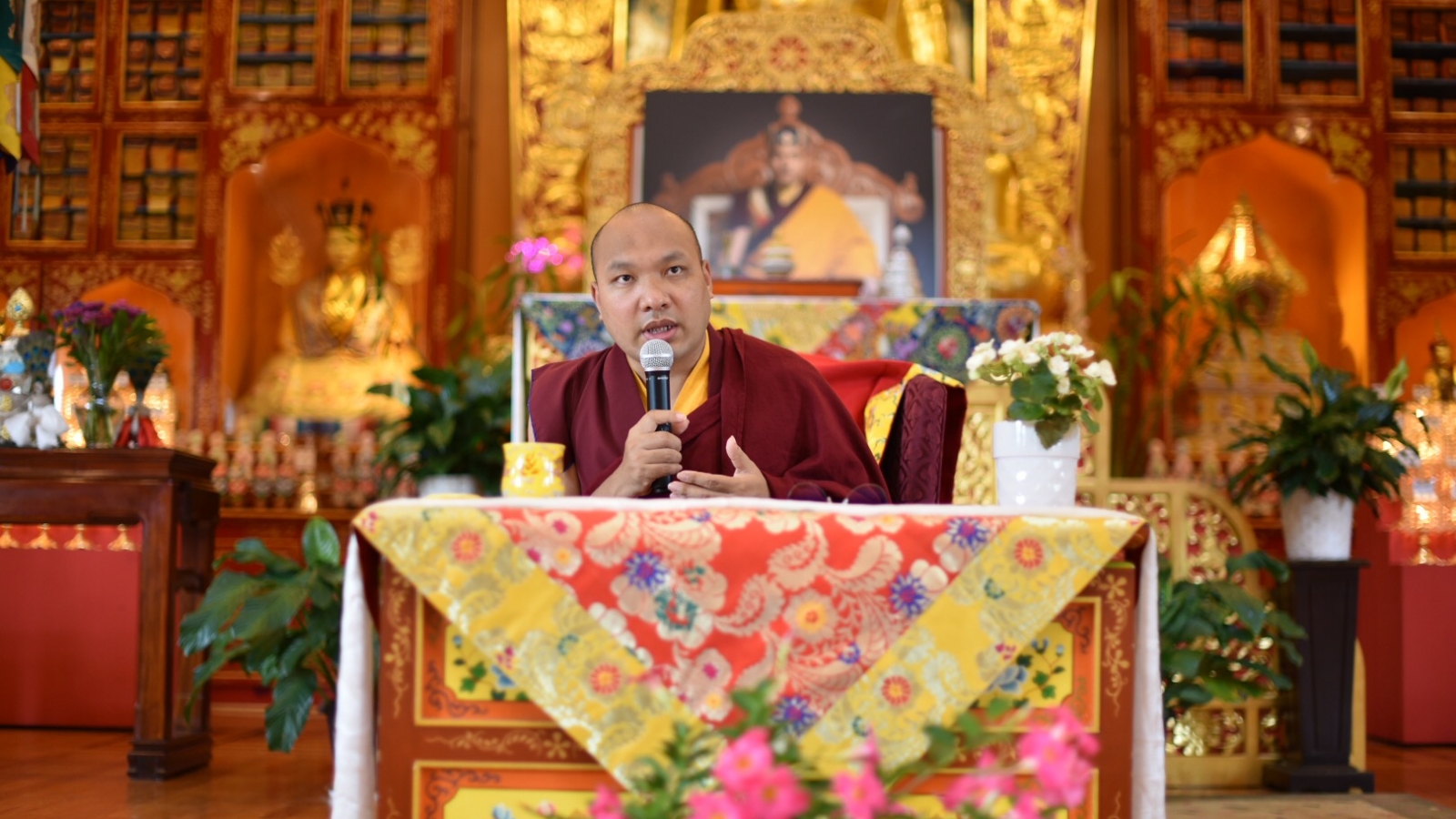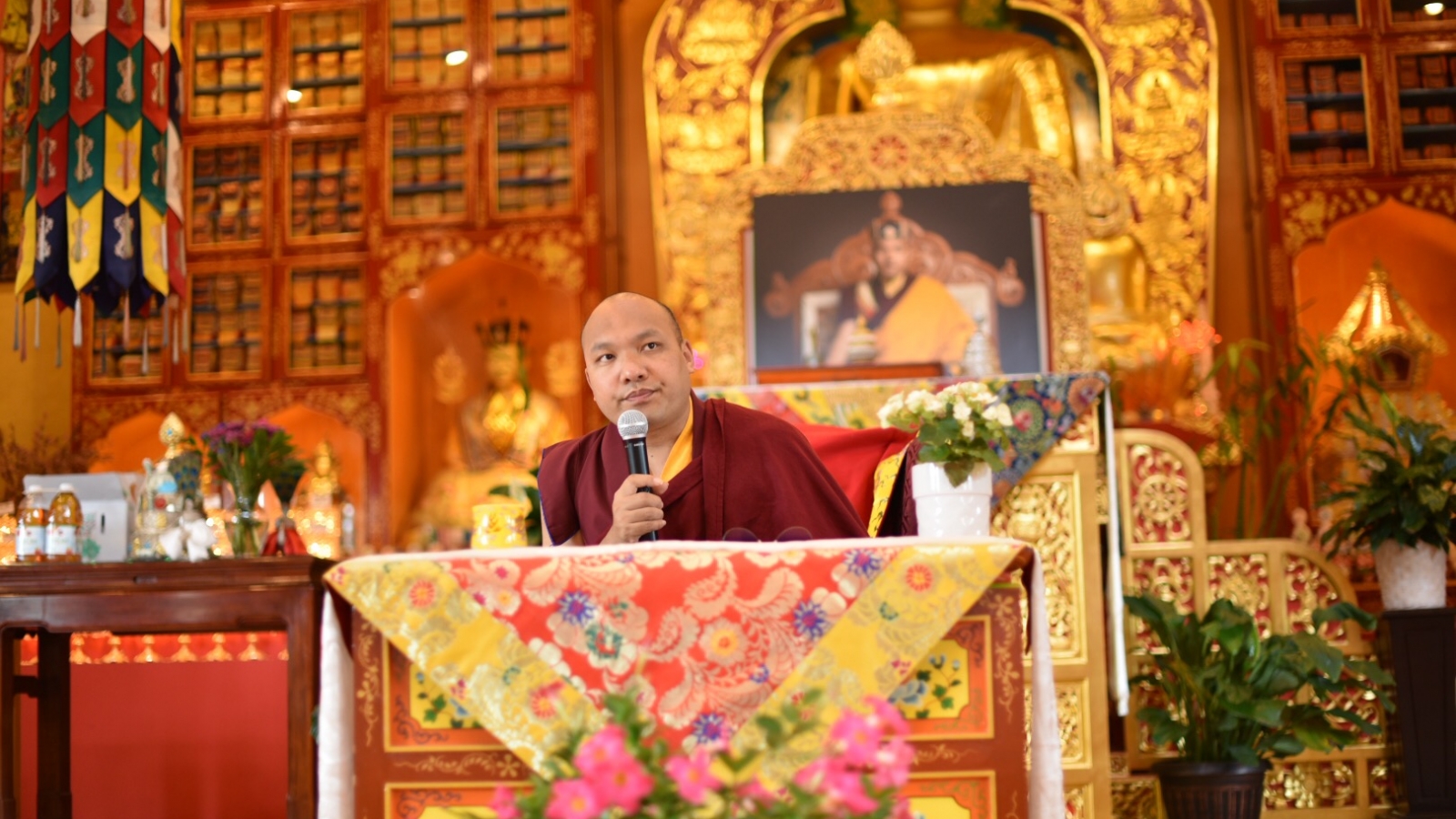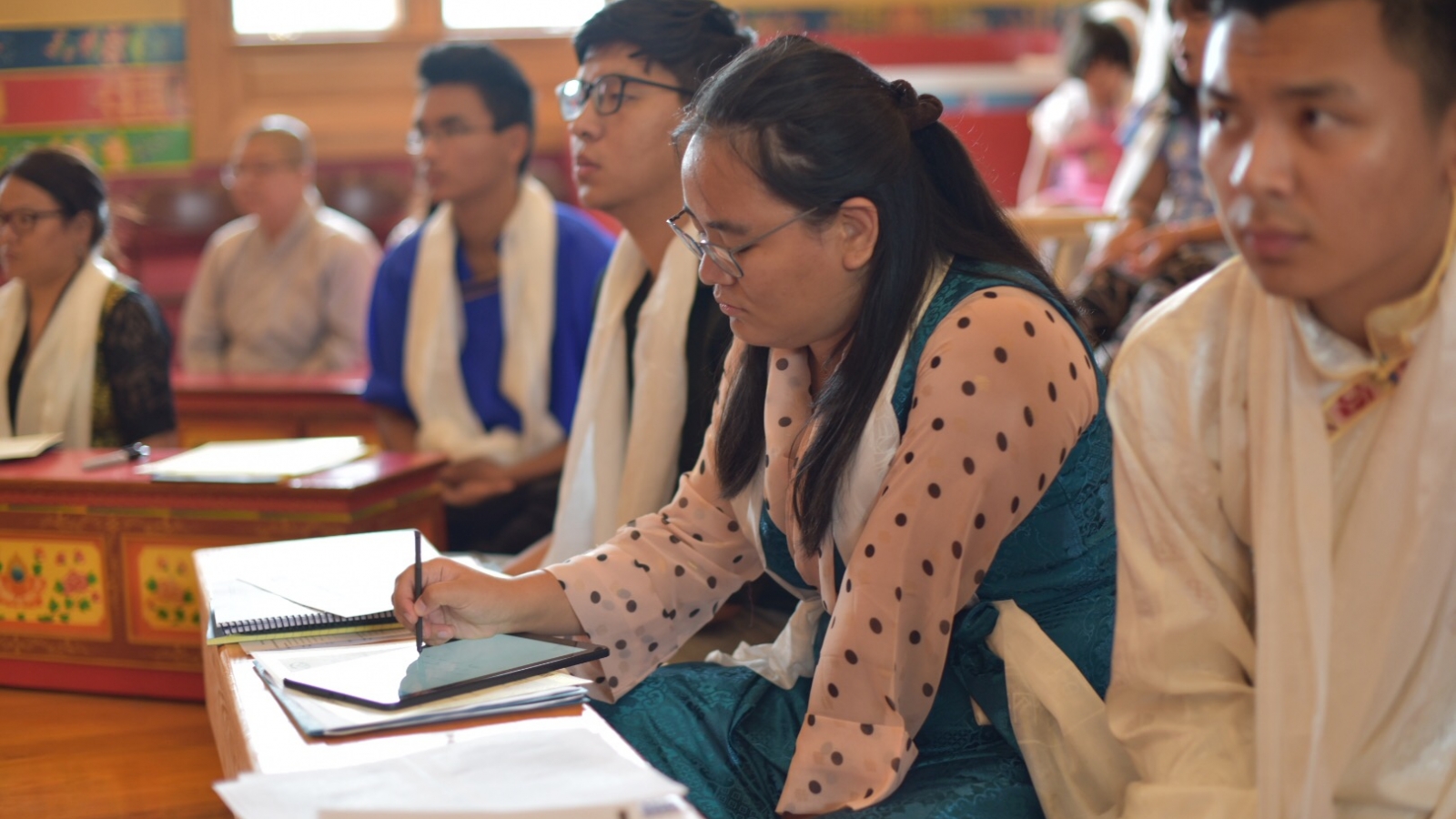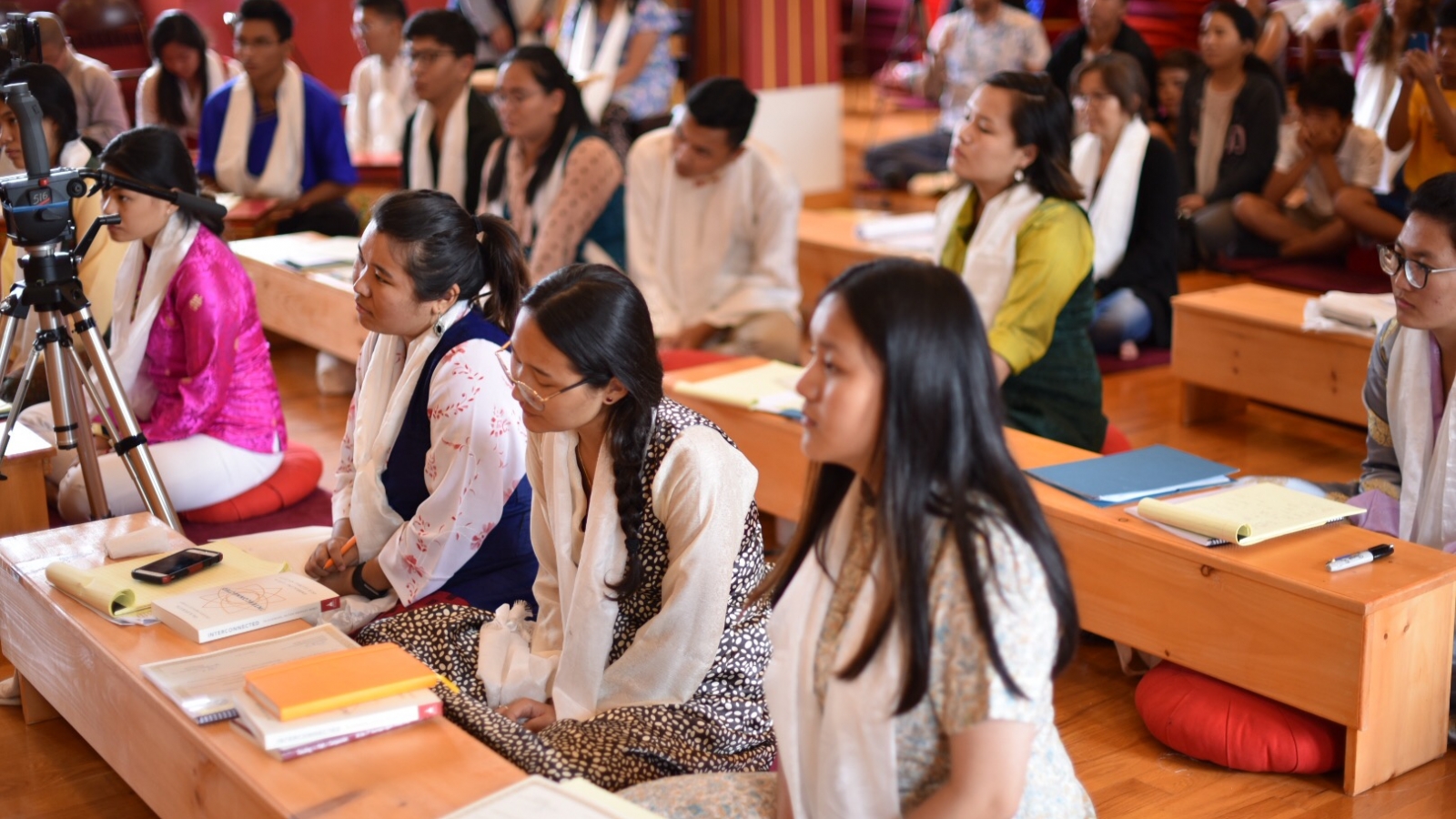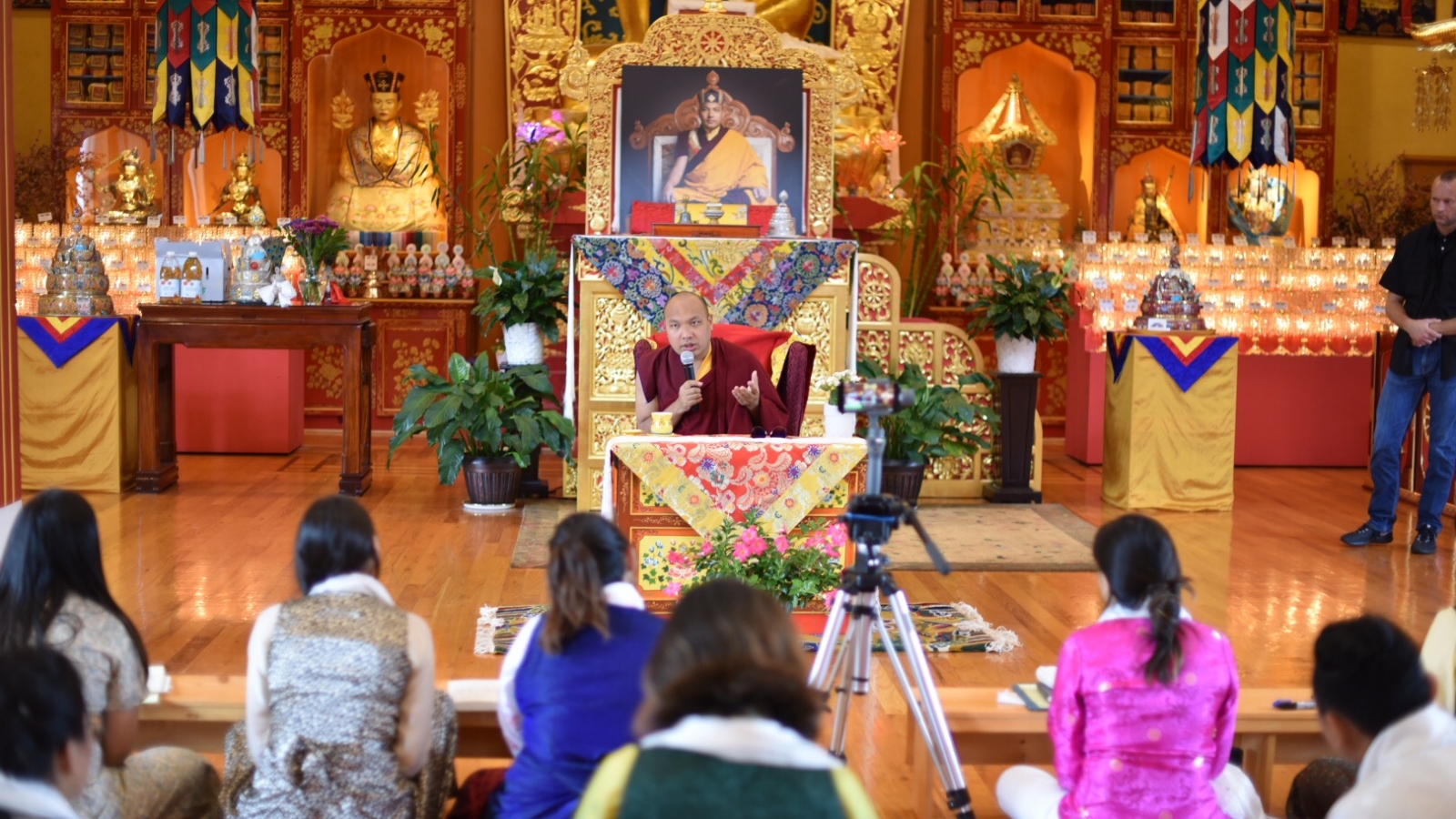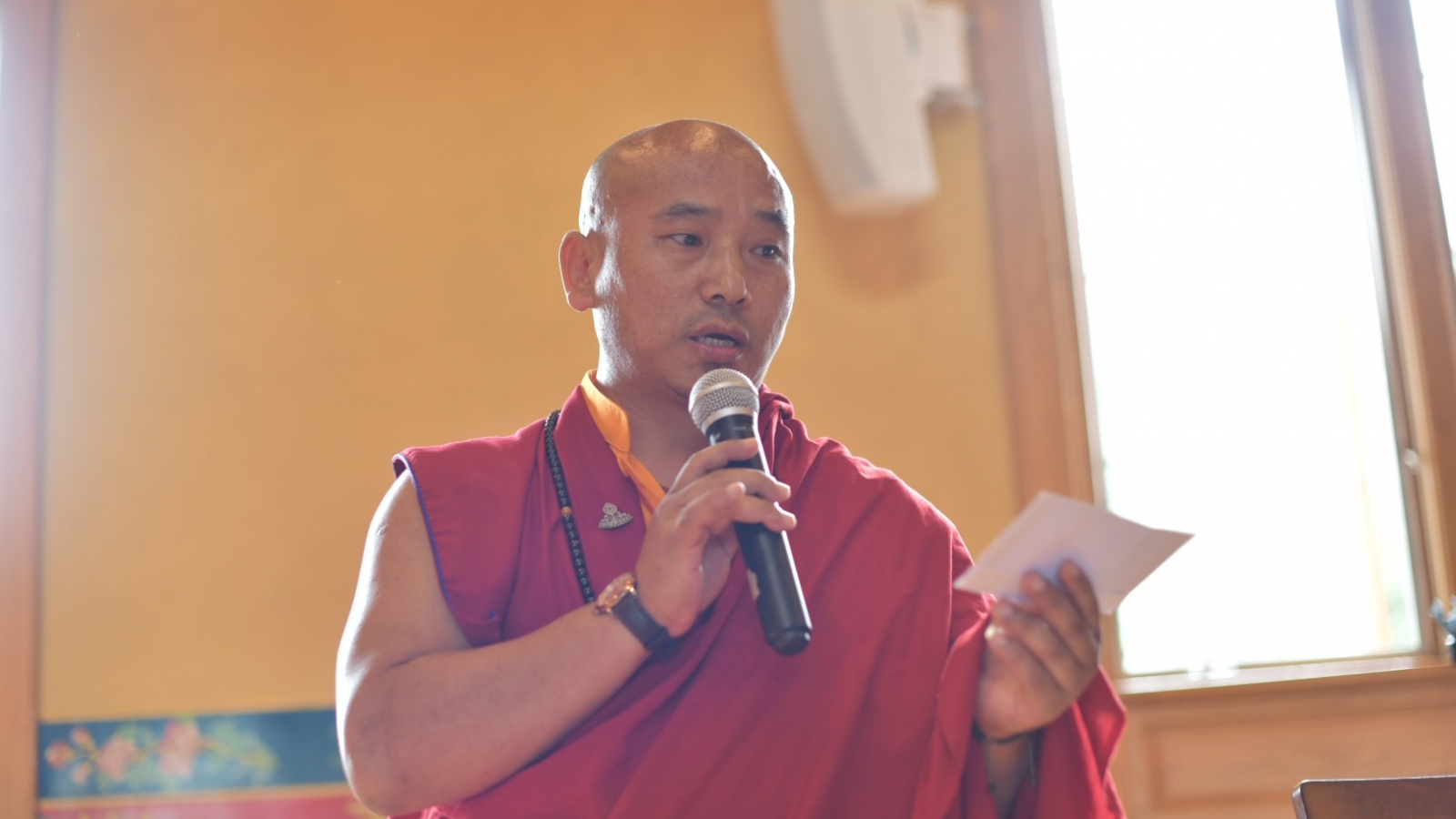Karma Triyana Dharmachakra, Woodstock, New York
August 19, 2018
From August 16 to 19, twenty-three Tibetan university students came from all over the United States to attend four-day seminar at the Karmapa’s main seat in North America, Karma Triyana Dharmachakra. On the first day, they gathered in the radiant shrine hall to learn about contemporary issues related to Tibet through talks given by Buchung Tsering, Vice President of the International Campaign for Tibet, TenzIn Dorje, Program Director at the Tibet Action Institute, and Kunga Tashi, Chinese Liaison Officer for the Office of Tibet. Also present for the four days was Ngodup Tsering, the Representative of His Holiness the Dalai Lama to North America, who addressed the group at the end of the second day, giving a clear introduction to the Central Tibetan Administration’s vision for the future.
The second day began with a masterly and comprehensive introduction to Tibetan Buddhism by Khenpo Pema Wangdak, the director of Vikramashila Foundation and the Palden Sakya Centers. He laid out the Buddhist path and then led the group in meditation, adding the lovely touch of a slight smile to the traditional seven points of the posture.
His presentation was followed by two sessions on humanizing leadership by Ellen Petry Leanse, a leadership coach and tech pioneer, who has spent over 35 years working with the leaders at Apple, Facebook, and Google. Her book, The Happiness Hack, is a guide on how to use our brain to be in touch with our deeper selves and increase our ability to live in accord with our intention. She embodied and presented a new approach to leadership. We stand up to be a leader and stand back to make room for others, she said, giving our presence and opening our awareness while making sure that all voices are heard. She explained how the brain works and how physiological and psychological reactions affect it. This means that we can retrain our brain—the brain wires what it fires—by moving beyond our comfort zone and stretching ourselves so we become less reactive and more spacious and aware.
The final two days were given over to a course in secular ethics, taught by Lobsang Tenzin Negi, the Executive Director of the Center for Contemplative Science and Compassion-Based Ethics at Emory University, and also by his old friend, Geshe Dadul Namgyal, the Senior Resident Teacher at Drepung Loseling Monastery in Atlanta, who also works on the Emory-Tibet Science Initiative. The participants were given a handbook entitled, SEE Learning, Social, Emotional, and Ethical Learning: An Initiative for Educating Heart and Mind. This served as a basis for the talks that laid out the intellectual framework for secular ethics. These ideas were brought home through group exercises and meditations that allowed for exploration on an experiential level. Lobsang Tenzin Negi summarized the Dalai Lama’s vision for a secular ethics in the following way. It is not a set of rules about right and wrong nor codes to comply with; it is rooted in common human values and in common sense, common experience, and scientific facts—in sum, the realities of our shared humanity. Secular ethics also enhances our emotional and social competencies and can be shared by people of all backgrounds. On Saturday evening, a sense of sharing and connection was carried over into joyous Tara dancing and an enthusiastic engagement in traditional Tibetan circle dances.
For the final session on Sunday, the Karmapa came to the veranda of the shrine hall for a group photograph with all the students and teachers. Afterward they moved back inside, and final thanks were given to everyone including the organizers and KTD staff. Three students reported on their experience, and afterward each participant was given a certificate and had their photograph taken with the Karmapa. The final talk was given by His Holiness in Tibetan.
He began by thanking those who had made this conference possible and expressing how happy he was that this meeting about secular ethics and preserving Tibetan language and culture could take place in the temple founded by the previous 16th Karmapa, Rigpe Dorje. His Holiness then continued to speak to the students gathered before him in the beautiful shrine hall.
“The preceding speakers have been very eloquent, so I will speak briefly,” he began. “Secular ethics are vital to our lives, as His Holiness the Dalai Lama has explained so clearly, and from what I have heard, the two teachers here have done an excellent job in presenting this topic. If we step back and look at all the livings beings on our planet, we can see that human beings have a special characteristic: they have the moral capacity to distinguish between right and wrong, between good and bad. Therefore, given our special ability, secular ethics are very important to us as human beings.
“Among the many religious traditions, ethical behavior is important,” he noted, “and in particular, Buddhism emphasizes the faculty of discernment, of being able to distinguish between what is beneficial and what is harmful. We are encouraged to examine and analyze, differentiating these two, and thereby, sharpening our discernment to a fine point. The Buddha advised his disciples not to take something on his word, but analyze for themselves to find out if it is true or not. First, they should look carefully into how things really are and then practice.”
The Karmapa then turned to speak of His Holiness the Dalai Lama. “Not only has he studied from a young age Buddhist philosophy and practice, but he has also traveled the world and dialogued with leaders from numerous religions traditions as well as experts in various fields of science. Therefore, his way of thinking is not bound by one tradition but remains very open, which allows him to reach out and connect with all kinds of people who, whether they are religious or not, can understand and respond to what he is saying. In this way, when it comes to morality or ethics, His Holiness has become a major voice in the world.
“The Dalai Lama’s many years of experience have shaped the secular ethics that he has imparted to us. As the recipients of this gift, we should regard it as very precious and practice it ourselves as much as we can. If we explain secular ethics to others, it might be uncomfortable if we were trying to promulgate the absolute truth of a particular religion. But on a human level, we can have the genuine wish to help others and to promote a mutual respect for each other. This kind of teaching is important because it can be heard and accepted by most people.
“Since His Holiness the Dalai Lama is a religious leader, he would naturally speak in terms of religion, yet here he is speaking of a secular ethics. The Geshes and the knowledgeable people in the Tibetan world found it hard to conceive of ethics separate from religion. How could that be? We Tibetans are connected to religion, so when hearing about secular ethics in the beginning, we found it difficult to understand and accept the idea right away. How is it that His Holiness the Dalai Lama could be talking about an ethics that is not bound up with religion? However, if we make an effort to think about it, we will discover its deeper meaning. It is something we can consider in depth, which we all should do.”
The Karmapa expressed his appreciation for the teachings on secular ethics that had been given over the last days, which emphasized how important it is to become a good person. He also spoke of the Tibetan language as it is written and spoken. “It is important for us Tibetans in this contemporary world,” he stated, “to make a real effort to speak and write our language as a native would.” He remarked that he had talked about this often, and then asked, “As Tibetans learning our language what is our greatest problem?” He replied, “There is a considerable discrepancy between the way we speak and the way we write. Some people cannot write at all, and those who do often make mistakes. So there is a significant difference between our ability to speak and our ability to write.
“Further, some people speak in a Tibetan that has deteriorated over time. Nevertheless, everyone should be able to write, which would be easier if spoken and written Tibetan were in accord. This would facilitate our reading and understanding of Tibetan. This is a topic we can revisit in the future,” he suggested.
“I know many foreigners who can read Tibetan texts and understand them,” he continued,” but it is also true that when it comes to speaking, they have problems and tend to mix things up. Further, if people who had studied colloquial Tibetan outside of Tibet were to travel to Central Tibet, for example, they would have difficulties in conversing with the people who live there. So there are those who can read but not speak Tibetan or not speak it well. Considering all this, it seems that it is easier to read Tibetan than to speak it.
“However that may be, we Tibetans are the ones who should be studying written and spoken Tibetan with the greatest interest. For Tibetans who live outside Tibet, a primary, if not the primary, task of this life is to study our written and spoken language. If we were born in Tibet, even if we would not have studied Tibetan, we would have naturally learned to speak it, as we would have lived surrounded by the language, immersed in its verbal environment. Those of us living abroad, however, must make a concerted effort to study our language. If we do not apply ourselves in earnest, there is the great danger that we will lose it. Your parents can teach you and say, ‘Speak Tibetan when you are at home.’ Recently, I heard a story about two Tibetan children who were walking along the road after school. One was speaking Tibetan and the other complained, ‘How come you’re talking in Tibetan? We haven’t gotten home yet.’
“If we did not study Tibetan with our parents when we were young, we can still learn it. Most of you, for example, must have been good students as you are attending a university. Since you have what it takes to learn something well, you can study Tibetan on your own initiative. Among the Tibetans, you have had a special opportunity. When I grew up, for example, I did not go to school. Until I was seven, I lived as other people did, and in our area you could not even set your eyes on a school nor was there anyone to teach us. But all of you have had the chance to go a university; you have studied well and your knowledge of a language both spoken and written is good. Your fellow Tibetans are proud of you, and I am very happy about this, too.
“These days, the biggest difficulty for Tibetans is preserving their spiritual heritage and their culture. The essential nature of the Tibetan people is on the verge of being lost, so we must make an especially strong effort. If you can take a genuine interest in Tibetan, I do not think it will be very difficult for you t learn it well.
“I have studied many languages and some of them I have not used, so I have gradually forgotten how to speak them. For example, I studied Korean for a good while, but have had no chance to speak it, as there is no point in talking Korean to Tibetans, so it has gradually faded from memory. It is important, therefore, for you to continually speak Tibetan and keep it alive. From one point of view, you could say that the opportunity to study Tibetan is growing, as we have a number of documentaries and films in Tibetan, which we can see and naturally improve our knowledge of Tibetan.”
On this positive note, the Karmapa ended his talk, adding his thanks to the teachers and organizers of this event. He especially expressed his happiness that this event that had brought young Tibetans to Karma Triyana Dharmachakra to study and he cordially invited them to return in the future.


